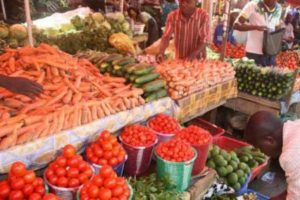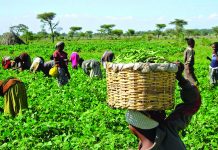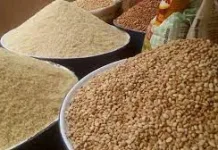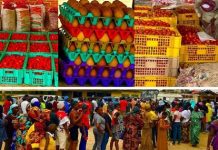A woman had approached a food store with a certain budget in mind, hoping to buy beans for her family. She was shocked to find that the once cheap food item has gone beyond her reach.
Few months in office, President Bola Tinubu told Nigerians that if he must, as Moses, take them to the ‘promise land’, they must be willing to make sacrifices.
Nigerians, in their desperation to have a better country had accepted to bear the ‘baby sacrifices’ as described by Tinubu.
But these baby sacrifices have now matured, running their small monthly income down few days into a new month.

Indeed, what many never anticipated was the level of hunger they are facing now.
There has been a notable surge in the prices of food items over the past few months which has led to protests in some states. Although the Senate leadership said these protests were sponsored. But that is a story for another day.
Sadly, the buying capacity of the average Nigerian has reduced, as the crisis in the economy bites harder and deeper.
Nigerians no longer follow the routine of eating three times a day, in fact, eating twice has become very difficult for many.
Fuel Subsidy
Nigerians cannot help but wonder, what could be the cause of this increase?
The rise in the commodity prices is a resultant effect of the removal of subsidy which the president announced during his inauguration on May 29, 2023.
In a video sighted on social media, a farmer explained that one of the major reasons for the increment in food items is insecurity.
According to the farmer, his colleagues have suffered great loss due to attack from bandits, what’s worse, some have given up on the profession.
Before now, there were some food items that an average Nigerian could buy without even feeling it, but now, it is difficult to afford those same items.
Below are some food items that have become difficult for the average Nigerian to afford.
Rice
Rice is the most eaten food in the world, and a largely consumed staple in Nigeria. It is filling and was affordable until recent times.
A 50kg bag of Nigerian rice now commands prices ranging between ₦50,000 and ₦60,000, a significant rise from the ₦45,000 it fetched in December 2023.
Similarly, foreign rice is now sold for prices ranging between ₦70,000 and ₦80,000, compared to the previous price of ₦65,000.
A derica (local measurement) of rice is now ₦1,200 Naira.
Bread
This widely eaten food has always been cheap, in fact, one of the cheapest food items.
Bread was a go to meal for manual labourers who seek meals that could keep them full for a very long time.
However, this once easily accessible food item is gradually becoming a luxury.
Bakers throughout Nigeria have voiced their grievances, citing a surge in the costs of baking essentials over the past year.
This led to the closure of many establishments and instability for those that remain operational.
Previously, a bag of flour, priced at ₦37,000 a month ago now stands at ₦42,000, while sugar, previously sold for ₦62,000, has skyrocketed to ₦72,000.
Consequently, a loaf of bread previously priced at ₦200 is now ₦500, and a family-sized sliced loaf, once available for ₦800, now sells for ₦1,200.
Beans
Beans are the most consumed plant-based protein meal in Nigeria. It is the fourth most-consumed item after cassava, yam and rice. It is no longer among the cheap food items.
Before now, people consider beans a poor man’s food, but all that is in the past.
It has myriad of health benefits and nutritional value.
However, this formerly affordable food item has also experienced a surge in price.
Presently, in numerous markets throughout Nigeria, a half-paint of beans, previously priced at ₦1,250, now goes for as high ₦2,500.
Garri
Garri is a widely consumed food item in Nigeria. Before now, it is considered a cheap food item.
It was well-known as a poor man’s meal. Many persons had described Garri as a ‘Saviour’.
However, what was once a readily accessible food, even for low-income earners, has now become high priced.
In markets across major cities, the price of a mudu of white garri, previously priced at ₦600, now ranges between ₦1,000 and ₦1,200.
A mudu of yellow garri, previously sold for ₦500, now commands prices between ₦900 and ₦1,000.
Eggs
Poultry farmers have pointed to the high cost of bird feed as the reason for the surge in Egg price.
You May Like: See How Market Prices Of Foodstuff Is Rising
Previously, a crate of eggs sold for ₦2000-₦3000 now goes for prices ranging between ₦3,800 and ₦4,000, varying according to size.






